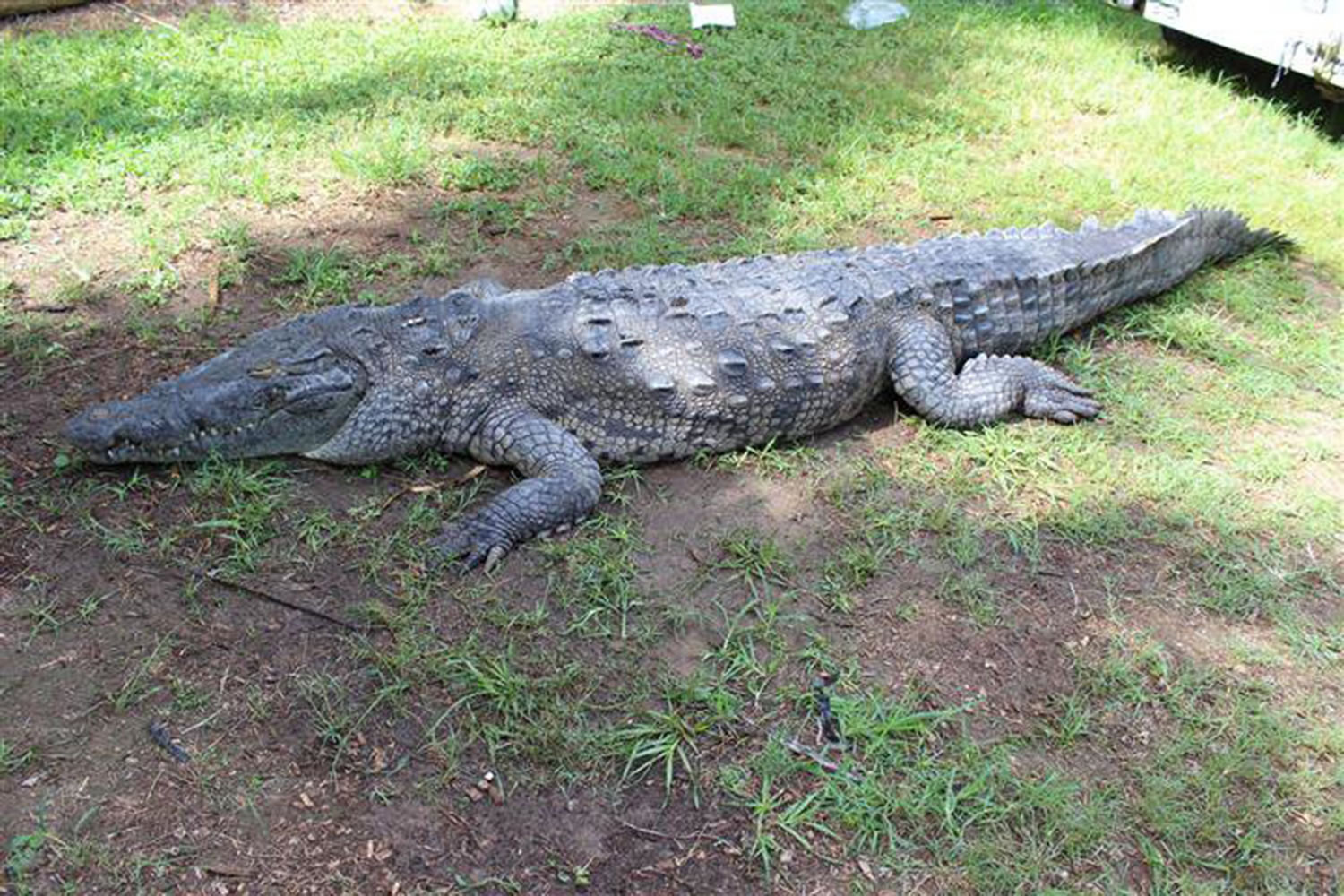MIAMI — Pancho — a 12-foot, 300-pound American crocodile that has made its home in the backyard waters of the exclusive Gables by the Sea community — is dead.
The croc died while fighting his capture early Friday morning, authorities said.
“He died fighting,” said Jorge Pino, a spokesman for the Florida Fish and Wildlife. “He was weak and lethargic and at some point died.”
Pino said more than two trappers helped capture Pancho at about 3 a.m. Friday.
Pancho died on shore after being retained. He was found in the lake in which the two swimmers were bitten in Gables by the Sea.
His body was transported to a state facility for evaluation, Pino said.
The 24-hour hunt for Pancho, “Florida’s most wanted crocodile,” according to trappers, is now over.
Indeed, Pancho was accused of biting two swimmers who jumped into the canal early Sunday that runs through the manicured community, designated as a crocodile sanctuary.
The hunt for Pancho attracted the attention of half a dozen animal trappers from Collier, Miami-Dade and Monroe counties, becoming one of the largest searches that the Florida Fish and Wildlife Conservation Commission (FWC) has ever coordinated for a single reptile.
And the hunt has divided some Gables by the Sea neighbors, leaving them with mixed feelings about capturing Pancho. Residents say they know some of the crocs – a federally protected species – by name since many have had color-coded tags and markings on their tails.
Snaggletooth and Streetwalker are regulars along with Pancho, who is the largest and the oldest – and has been around the longest.
Some neighbors have grudging admiration for Pancho, because he has been relocated twice, but has always found his way back.
“Some are afraid of him, and others will miss him,” Hardwick said. “Some people don’t want the animal to go, so they sabotage the trapping process.”
To Hardwick’s frustration, some have interfered with trackers’ efforts to find Pancho, going so far as to refuse backyard access and to use loud noises to scare the crocs away.
Hardwick is pretty sure he had Pancho hooked late Tuesday night, struggling for 45 minutes to reel him in. But the croc escaped when a neighbor starting playing a U2 album.
“They know music will scare them, and that’s when Pancho escaped. It gave me a headache. I don’t know about the crocodile.”
Jan Falk, who lives on the water, said she stands with Pancho and faults the swimmers for jumping into the canal in a community clearly marked as a sanctuary.
The victims had left a party in the 1300 block of Lugo Avenue around 2 a.m. to go for a dip in the canal behind the home. Both were bitten but the injuries were not life threatening. An FWC report said the incident was alcohol-related.
“When you choose to live in a coastal area, you have to coexist with nature,” Falk said. “It was his environment before it was ours. He has a right to be there. He is protected. And people who jump into a canal at 2 a.m. are not only lending themselves to crocodiles, but to barracudas, bull sharks. They’re just as dangerous.”
His dock is known to be one of Pancho’s favorite hangout spots, so he installed a nanny cam with infrared lighting Wednesday, making the 24-hour live video feed available to the trappers.
“This way we can catch him in the act,” he said.
Meanwhile, as Hardwick prepared to trap Pancho yet again on Thursday, he was concerned that some neighbors may try to take matters into their own hands. He stressed the importance of relocating Pancho from the canal to a facility where he will be in protected custody.
Once a croc bites a human being, they are sent to a licensed facility for the rest of their lives. Alligators are not so lucky – they’re killed, said Jorge Pino, an FWC spokesman.
“I understand that some people are attached to the crocodiles, but I have a job to do,” Hardwick said. “Public safety and human safety go above wanting a crocodile to stay around.”
Being bitten by an American crocodile is a rarity, according to Lindsey Hord, the FWC biologist in charge of dealing with South Florida’s nuisance alligators and crocodiles.
“We’ve not had a documented bite to a person by an American crocodile in Florida,” Hord said. “There are approximately 2,000 crocs in Florida.”
In comparison, alligators, the crocodiles’ cousin, are more likely to attack humans. There are 1.3 million gators in Florida, and around six recorded bites a year, Hord said.



